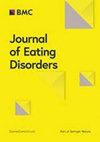The validation of short eating disorder, body dysmorphia, and Weight Bias Internalisation Scales among UK adults
IF 3.5
3区 医学
Q2 NUTRITION & DIETETICS
引用次数: 0
Abstract
When collecting data from human participants, it is often important to minimise the length of questionnaire-based measures. This makes it possible to ensure that the data collection is as engaging as possible, while it also reduces response burden, which may protect data quality. Brevity is especially important when assessing eating disorders and related phenomena, as minimising questions pertaining to shame-ridden, unpleasant experiences may in turn minimise any negative affect experienced whilst responding. We relied on item response theory to shorten three eating disorder and body dysmorphia measures, while aiming to ensure that the information assessed by the scales remained as close to that assessed by the original scales as possible. We further tested measurement invariance, correlations among different versions of the same scales as well as different measures, and explored additional properties of each scale, including their internal consistency. Additionally, we explored the performance of the 3-item version of the modified Weight Bias Internalisation Scale and compared it to that of the 11-item version of the scale. We introduce a 5-item version of the Eating Disorder Examination Questionnaire, a 3-item version of the SCOFF questionnaire, and a 3-item version of the Dysmorphic Concern Questionnaire. The results revealed that, across a sample of UK adults (N = 987, ages 18–86, M = 45.21), the short scales had a reasonably good fit. Significant positive correlations between the longer and shorter versions of the scales and their significant positive, albeit somewhat weaker correlations to other, related measures support their convergent and discriminant validity. The results followed a similar pattern across the young adult subsample (N = 375, ages 18–39, M = 28.56). These results indicate that the short forms of the tested scales may perform similarly to the full versions. This manuscript introduces short versions of existing measures of eating disorders and body dysmorphia, specifically the Eating Disorder Examination Questionnaire, the SCOFF Questionnaire, and the Dysmorphic Concern Questionnaire. We further investigate the properties of the recently introduced 3-item short version of the modified Weight Bias Internalisation Scale. Across analyses including measurement invariance testing and bivariate correlations aiming to assess convergent and discriminant validity, we find support that the short scales may perform similarly to their longer versions. These short scales may contribute in meaningful ways to research where the brevity of questionnaire-type measures may make a difference by contributing to data quality.在英国成年人中验证简易饮食失调、身体畸形和体重偏差内化量表
在向人类参与者收集数据时,尽量缩短问卷调查的长度往往非常重要。这样既能确保数据收集尽可能吸引人,又能减轻回答负担,从而保护数据质量。在评估饮食失调症及相关现象时,简洁尤为重要,因为尽量减少与羞耻、不愉快经历有关的问题,反过来又可以最大限度地减少回答时的负面影响。我们依据项目反应理论缩短了三个饮食失调和身体畸形测量项目,同时确保量表所评估的信息尽可能接近原始量表所评估的信息。我们进一步测试了测量不变性、同一量表不同版本之间的相关性以及不同测量方法之间的相关性,并探讨了每个量表的其他特性,包括其内部一致性。此外,我们还探讨了修改后的体重偏差内化量表的 3 个项目版本的表现,并与该量表的 11 个项目版本进行了比较。我们引入了 5 个项目版的进食障碍检查问卷、3 个项目版的 SCOFF 问卷和 3 个项目版的畸形关注问卷。结果显示,在英国成年人样本中(样本数 = 987,年龄 18-86 岁,平均年龄 = 45.21 岁),短量表的拟合度相当高。长短量表之间存在显著的正相关,与其他相关测量指标之间也存在显著的正相关,尽管相关性稍弱,但这都证明了它们的收敛性和鉴别性。年轻成人子样本(N = 375,18-39 岁,M = 28.56)的结果也与此类似。这些结果表明,受测量表的简表可能与完整版具有相似的表现。本手稿介绍了现有进食障碍和身体畸形测量方法的简易版,特别是进食障碍检查问卷、SCOFF问卷和畸形关注问卷。我们还进一步研究了最近推出的改良体重偏差内化量表的 3 个项目简易版的特性。通过测量不变性测试和旨在评估收敛性和鉴别有效性的双变量相关分析,我们发现短量表与其长版本的表现相似。这些短量表可能会对研究做出有意义的贡献,因为问卷类测量的简洁性可能会通过提高数据质量而发挥作用。
本文章由计算机程序翻译,如有差异,请以英文原文为准。
求助全文
约1分钟内获得全文
求助全文
来源期刊

Journal of Eating Disorders
Neuroscience-Behavioral Neuroscience
CiteScore
5.30
自引率
17.10%
发文量
161
审稿时长
16 weeks
期刊介绍:
Journal of Eating Disorders is the first open access, peer-reviewed journal publishing leading research in the science and clinical practice of eating disorders. It disseminates research that provides answers to the important issues and key challenges in the field of eating disorders and to facilitate translation of evidence into practice.
The journal publishes research on all aspects of eating disorders namely their epidemiology, nature, determinants, neurobiology, prevention, treatment and outcomes. The scope includes, but is not limited to anorexia nervosa, bulimia nervosa, binge eating disorder and other eating disorders. Related areas such as important co-morbidities, obesity, body image, appetite, food and eating are also included. Articles about research methodology and assessment are welcomed where they advance the field of eating disorders.
 求助内容:
求助内容: 应助结果提醒方式:
应助结果提醒方式:


